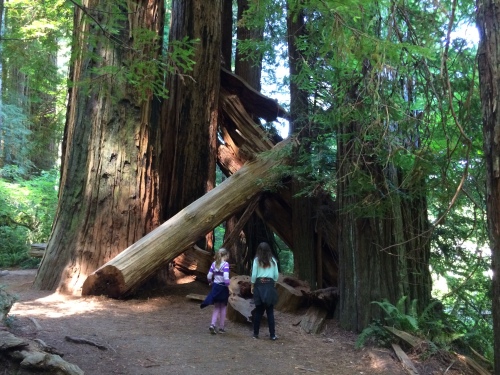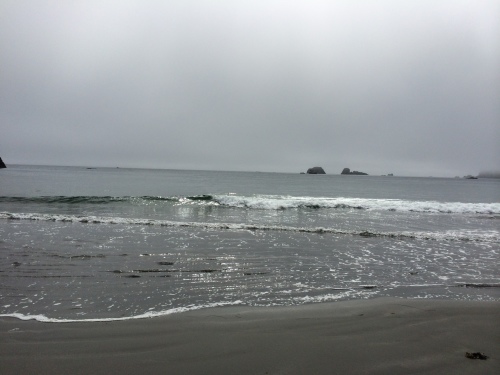Redwoods, Oceans, and Big Skies: Homily for the Twenty-ninth Sunday in Ordinary Time
If you drive to northern California through central Oregon,
you cross the state line on US 199,
also known as the Redwood Highway.
As you continue into California,
you reach a certain point where it feels like you’ve entered a fairytale.
It feels like your car has shrunk,
and now you’re driving a Hot Wheel,
because there are these massive, massive trees
stretching above you, over your head,
these ancient redwoods.
And if you get out of your car and walk around the groves of redwoods
you feel like you’re in God’s forest,
with these ancient, ancient trees towering above you
bigger than any trees you’ve ever seen.
It really does feel like God is there,
like God has somehow imprinted himself on the majesty of these trees.
The trees reveal just how great God is.
And if you get back in your and keep going on US 199
like Brenda and I did this summer with the girls
you eventually meet up with Highway 101.
And just a few miles down the road is the small town of Crescent City.
And if you get out of the car in Crescent City,
then you’re confronted with crashing of the Pacific Ocean
as it batters against the California coast.
You see the water as it stretches west seemingly forever.
And like the redwoods, the ocean bears the imprint of God:
in its majesty, in its power, it is an image of God.
We also drove to South Dakota this summer
to meet with my family at Mount Rushmore
and celebrate my parents’ fiftieth wedding anniversary.
And just as when you drive through the redwood forest
and just as when you see the Pacific Ocean in Crescent City,
when you drive over the Rocky Mountains
no matter how many times you do it,
you’re struck by the majesty of the mountains
and that beautiful big Montana sky.
Some people call Montana “God’s country”
with its big skies and the Rocky Mountains.
You have this impression that God has imprinted his image
in that sky and on those mountains.
In the gospel today, Jesus talks about an image,
an image on a Roman coin,
because the Pharisees and the Herodians
have come to trap him.
The Pharisees and the Herodians are rivals,
but they have come together this time
because they’re united in their desire to see Jesus fail.
So they ask Jesus if it is lawful to pay the taxes.
And that’s when Jesus asks to see the coin.
He says, “Look, who’s face is this? Who’s writing, who’s inscription?”
It’s Caesar’s, so obviously the coin belongs to him,
it’s ok to give it back to him, it’s not a big deal.
What is a big deal is the last phrase:
“Give to God what belongs to God.”
And just as we can know what belongs to Caesar
by the image on the coin,
we can know what belongs God by seeing God’s image imprinted on them.
And so we can see that the ocean belongs to God
because God’s power is imprinted on it.
We know that the sky belongs to God because of its size and its depth,
and its grandeur.
“The world is charged with grandeur of God,”
as the Jesuit poet Gerard Manely Hopkins puts it.
The ocean, the sky are images of God.
But the author Victor Hugo has this wonderful line
in his novel Les Miserables,
“There is one spectacle grander than the sea, and that is the sky.
There is one spectacle grander than the sky,
and that is the interior of the soul.”
If we can see the imprint of God on the ocean,
if we can see the imprint of God on the big sky of Montana,
or on the redwoods of northern California,
then how much more should we recognize the imprint of God
on our own souls?
Because our souls have a greater depth than the ocean,
than the redwoods,
than the stars in the sky above us.
And if, therefore, the image of God is upon our soul,
and if you can recognize who something belongs to
by the image that’s on it,
then we can say that we belong to God.
If the image of God is on our soul
if the Word of God is inscribe on our hearts,
then we belong to God.
Like that Roman coin that bore the emperor’s image,
we bear the image of the great emperor,
the Almighty Lord.
“In God’s image he created them.”
We are created in God’s image.
And because we are created in God’s image,
then we belong to God.
But we don’t belong to God as a possession,
as if God is the owner and we are slaves.
Rather, this is belonging in the sense of “being a part of,”
“being intimately connected to.”
The way a husband and wife belong to each other.
The way children belong with their parents.
The way we belong to this community of believers,
and this community of believers belongs to God.
And if we belong to God,
then we are to give to God what belongs to God.
This is a reminder to Pharisees, to the Herodians, and to us.
We are to give ourselves to God.
If we belong to God, how do we give ourselves?
And besides, God already has everything.
How do you give God something, when God already has it all?
We cannot give him our homes our possessions.
God already is Lord of the universe.
We cannot give him anything that he does not already possess.
But there is one thing that God does not have
unless we give it.
There is one gift that God has given us
that he will never take back from us forcefully.
And that is our free will to love him.
God never compels our love.
If God possessed our love, controlled our love, forced our love,
then it wouldn’t be love.
And so, what we give back to God is our entire being,
out of love.
To love someone means to want their well being,
to want them to be fulfilled and complete.
But God is already fulfilled and complete.
What more does God want?
What God wants is deep joy and salvation for everyone.
If we want to give ourselves to God
then we need to become part of this great desire of God’s
for everyone to live a full life.
It is to recognize the image of God in our brothers and sisters
here and especially in our brothers and sister who are in most need
who are most ignored
who are most overlooked.
When we begin to see the image of God in our neighbors,
in our enemies
and in the poor
then we begin to offer back to God
we begin to repay God,
we, who belong to God.
St. Lawrence the Deacon understood this well.
He knew where the image of God was to be found.
You see, it was during a time of great persecution.
In fact the persecutions were so bad, Pope Sixtus was martyred.
The Romans killed the Pope.
The prefect in Rome at the time
believed that the Church had all this money hidden away,
so he brought St. Lawrence before him and gave him an ultimatum:
“Bring me the treasure of the Church or be executed.”
He gave Lawrence three days to collect it,
and if he didn’t bring it, St. Lawrence would be tortured and killed.
And so the three days went by,
and on the third day St. Lawrence appeared before the prefect
with all the poor and sick of the city, and he said,
“This is the Church’s treasure!”
We, who have the image of God imprinted on our souls,
we belong to God.
just like the redwood forest, the Pacific Ocean, and the big sky of Montana.
And not just we who are gathered here,
but especially the poor and the sick.
They belong to God, too.
We celebrate that today at this altar,
and we ask for the will and strength
to give all we are back to God.
Podcast: Play in new window | Download
Subscribe: RSS

































